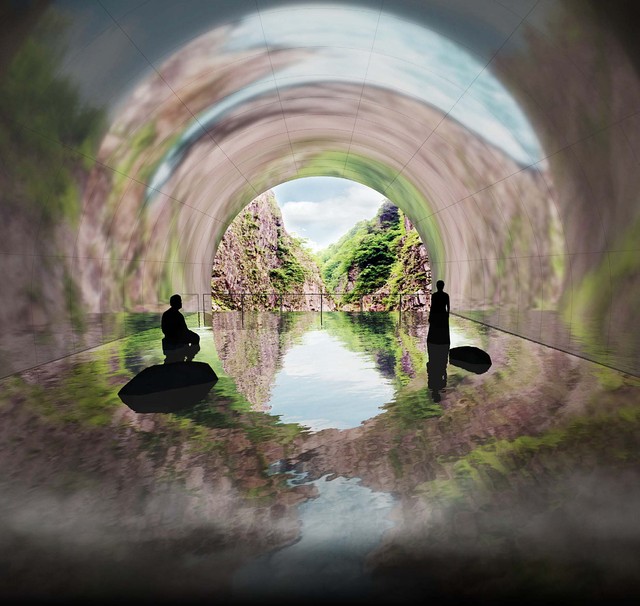The inventor of the festival, Fram Kitagawa has been consistently acting as the general director, and for the 7th edition, about 160 new works will be created in addition to over 200 existing works created by global artists such as Marina Abramovic, Christian Boltanski, Cai Guo-Qiang, Anthony Gormley, Ilya & Emilia Kabakov, James Turrell, Yayoi Kusama and many more. In total, about 360 works by the artists, architects, and performers from 44 countries will be unfolded over 760 square kilometers of the land, terraced rice fields, mountains, forests, empty farming houses, and closed school buildings.
Art tourism for the age of global environmental awareness
Echigo-Tsumari Art Triennale has developeda new form of journey: guided by art through the Satoyama landscape. The visitors interact with the works, and more broadly with the region and local people, while traveling from one work to the next. The pilgrimage allows the visitors to reexamine global environmental approaches, and expand the dialogue of how people relate to nature. The 2018 Triennale will offer the official bus tour with two courses: the Satoyama and civil engineering course and the Shinanogawa river terrace course. Each course will highlight new and major works, the landscapes and livelihood fostsered through great efforts of agriculture to produce rice and survive in the severe nature, and provide special lunch.
Questioning the homogenous space of the modernity
As a special exhibition, Hojoki Shiki in 2018: The Universe of Ten Foot Square Huts will be held at the Triennale’s main venue, the Echigo-Tsumari Satoyama Museum of Contemporary Art, KINARE. It is the starting point of a long-term initiative of "Echigo-Tsumari Hojo Village," where each space will be transplanted in the central area of Tokamachi City in the future. Inspired by Kamo no Chomei, a poet and recluse in the Middle age, who willingly lived in a ten foot squre hut("hojo") amidst continuing disasters and wars, the exhibition shows a variety of ten foot square spaces with different functions (dwelling, office, shop, sauna, dining, etc.) designed by 30 groups of architects and artists selected through the open call (the jury: Hiroshi Hara, Ryue Nishizawsa, Fram Kitagawa), including Dominique Perrault Architecture and Toyo Ito & Associates. The visitors can experience a virtual "village" in full size, which surrounds a large pond created by Leandro Erlich. The exhibition is a proposal to break the fetters of homogenous space that covers the world of today, and examine the role of architecture and art in an era in which local values have been swamped by globalization.
Global Development of Networks
Echigo-Tsumari Art Triennale has been internationally recognized as a model of regional revitalization with art, and the issues Echigo-Tsumari has faced to bring vitality to the region are shared by many regions in the world, in particular in Asia. Foreign governments and organizations have set up satellites in Echigo-Tsumari; Following the Australia House, built with support of Australian government, the China House was established in 2016, and this summer, the Hong Kong House will be opened as the initiative of the Government of the Hong Kong Special Administrative Region.
The Echigo-Tsumari model is being exported abroad. In China, a large-scale art festival is being planned, inviting Fram Kitagawa as the director, under the governmental policy to resolve the disparity between the rural and urban areas. The press conference was held in Beijing on May 8 to announce the participation of Chinese artists as well as the establishment of the executive committee to organize the art festival in China.



